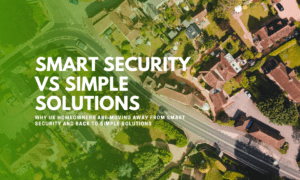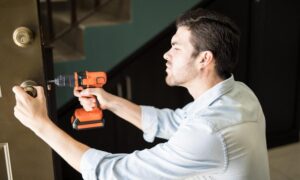With wired systems, hacking in requires physical access to the wiring. Hackers typically achieve this by cutting into the wiring or connecting a device to it. Identifying the right wires to connect to can be difficult, but still possible. The connected device that enables hacking into the system is called a “backdoor.”
On the other hand, wireless systems can be more vulnerable to attack. Wireless systems are more vulnerable to hacking as they use radio waves to transmit data. With wireless systems, hackers can wirelessly intercept the signals sent from within your home security system to the control panel. This means they can gain access and change settings or even disable cameras or sensors without ever having to be near your property.
Protecting A Wired System
To protect your wired system, you should have your installer use tamper-proof covers on all key connection points and secure any wiring openings with grills or other physical barriers. You should also perform regular inspections of all equipment to ensure there is no unauthorized access or tampering. Additionally, if you are not using a professional security installer, be sure to only purchase equipment from reputable sources. Professional installation of residential security cameras is a great deterrent.
Protecting a Wireless System
To protect your wireless system, make sure it is regularly updated with the latest firmware. You should also ensure that your network and system passwords are secure and changed frequently. You should consider using encryption on all communications between the control panel and the individual devices. Additionally, you should consider using a reputable brand of wireless security cameras as they often have built-in encryption and other security measures that make them more secure than generic models.
Overall, the best way to protect your home security system from being hacked is to use a combination of physical barriers and technology-based measures to make it difficult for unauthorized access and tampering. Some of these are discussed below.
Understand the latest security technology developments
You should be aware of the latest security technologies available and make sure your system is up-to-date. This includes ensuring that new or updated software patches have been applied to all components of your system. For example, technologies have evolved to detect and prevent hackers from gaining access to your system wirelessly. If you are using an older technology, you may be leaving your system more vulnerable.
Regularly update passwords
You should change your passwords regularly, especially if you’ve hired a third-party installer or are sharing the password with other people. You should also make sure that all users have unique passwords and that they are strong.
Use two-factor authentication where possible
Technology for seamless two-factor authentication is available for many home security systems. This technology adds an extra layer of protection by requiring users to enter a code sent to their mobile phone or email address before they can gain access to the system.
Encrypt your data
You should consider using encryption for any sensitive information being stored on devices in your home security system. Encrypted data is much harder for hackers to decipher, keeping your system more secure.
Implement network monitoring and ensure the home security system is updated regularly
Network monitoring helps you to detect unauthorized access attempts on your network and should be used when possible. Additionally, you should keep the home security system updated regularly with new firmware or software patches which may address any vulnerabilities or weaknesses in the system. This can help ensure that hackers are unable to exploit any known weaknesses in the system’s security .
Invest in a trusted anti-virus software to protect against malware and other threats
Having an antivirus software installed on all devices connected to your home security system is vital in protecting against the risk of malware and other threats. The anti-virus should be kept up-to-date with the latest virus definitions, as this will ensure that any newly-discovered viruses are identified and blocked from attacking your system.
Regularly check your security system logs for any suspicious activity
This is where many property owners fail the most, but it is important to review your system logs regularly for any suspicious activity or attempts to gain unauthorized access. If you do detect any unusual behavior, take steps to investigate and address the issue immediately.
Finally, when selecting a home security system provider, ensure that they have a proven track record of providing secure systems and offer support for any security issues that may arise.
By following these steps, you can help to protect your home security system from hackers and other malicious actors. Remember, the best defense is a good offense, so always be vigilant and proactive when it comes to protecting your property.



































